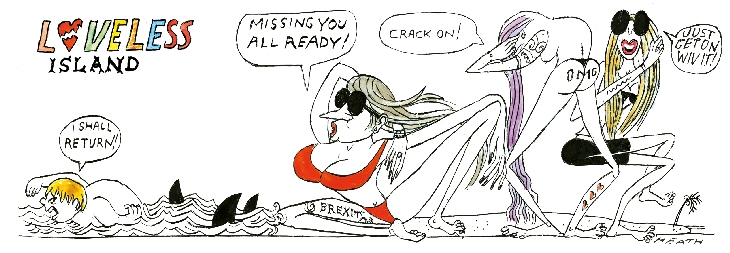Home
Boris Johnson resigned as Foreign Secretary the day after David Davis resigned as Brexit Secretary, both in reaction to a government plan for Brexit agreed by the cabinet after being held incommunicado at Chequers for 12 hours, their mobile phones confiscated. At Chequers, Mr Johnson was reported to have said: ‘Anyone defending the proposal we have just agreed will find it like trying to polish a turd.’ In his resignation letter he said that the Brexit ‘dream is dying, suffocated by needless self-doubt’, adding: ‘We are truly headed for the status of a colony.’ Dominic Raab, the housing minister, replaced Mr Davis; Kit Malthouse replaced Mr Raab. Jeremy Hunt, the health secretary, replaced Mr Johnson; Matt Hancock, the digital, culture, media and sport secretary, replaced Mr Hunt; Jeremy Wright, the attorney general, replaced Mr Hancock; Geoffrey Cox replaced Mr Wright. Steve Baker the Brexit minister also resigned, as did Maria Caulfield and Ben Bradley, vice-chairmen of the party, of which there had been at least nine. Lord Carrington, who resigned as foreign secretary at the outbreak of the Falklands War, died aged 99.
The contents of Theresa May’s Chequers plan, to be amplified in a white paper, was released as a three-page summary. It claimed to allow for a free-trade area for goods, as if the EU and UK were ‘a combined customs territory’; services were to be dealt with separately. There would be ‘a common rulebook’, with ‘the UK making an upfront choice to commit by treaty to ongoing harmonisation with EU rules on goods’; in other words a permanent treaty would oblige Britain to obey EU regulations. UK courts would have to have ‘due regard’ for EU case law. A facilitated customs arrangement would avoid Irish border checks. EU citizens would be able to ‘apply for study and work’ in the UK, and Mrs May refused to rule out preferential treatment for them. Jacob Rees-Mogg said Mrs May’s plan ‘would lead directly to a worst-of-all-worlds black-hole Brexit’.
Dawn Sturgess, 44, exposed to the Russian nerve agent Novichok at Amesbury, ten miles from Salisbury, on 30 June, died eight days later; Charlie Rowley, exposed to the poison at the same time, regained consciousness but was in a critical condition. Rail timetable changes for eight franchises, planned for December, were postponed in light of the chaos following new timetables on Govia Thameslink and Northern in May. England beat Sweden 2-0 to reach the semi-finals of the World Cup, from which Russia was eliminated by Croatia. Some England fans danced on the roof of an ambulance in London; roadsweepers in Nottingham cleared up six tons of broken glass.
Abroad
In the Thai province of Chiang Rai, 12 boys, aged between 11 and 17 and members of a football team, and their coach, were rescued from caves far underground, where they had become trapped on 23 June. They had been discovered by two British divers on 2 July. At least 33 people died after a tourist boat carrying mostly Chinese passengers, capsized off the Thai island of Phuket. Liu Xia, the widow of Nobel Peace Prize winner Liu Xiaobo, was allowed to leave China for Germany after being held in detention for eight years. Germany banned Osmanen Germania, an ethnic Turkish gang devoted to motorbikes and boxing.
On his way to a Nato summit in Brussels and a visit to Britain, President Donald Trump, of the United States, said: ‘I have Nato, I have the UK which is in somewhat turmoil, and I have Putin. Frankly, Putin may be the easiest of them all.’ Before he left, Mr Trump nominated Brett Kavanaugh for the vacancy in the Supreme Court. In Nicaragua protests against President Daniel Ortega, which have been going on since April, left 38 dead in a single day. PayPal wrote to a woman who had died of cancer, saying: ‘You are in breach of condition 15.4(c) of your agreement with PayPal Credit as we have received notice that you are deceased.’
Floods and landslides killed at least 155 in Japan and drove two million from their homes. A UN report on the war in South Sudan detailed atrocities against hundreds of civilians in April and May. An archive director in Valencia’s provincial government, earning ¤50,000 a year, was found not to have done a day’s work for a decade. Up to 4.6 million bottles of Spanish rosé wine have been labelled as French, according to the French state directorate for fraud control. CSH






Comments